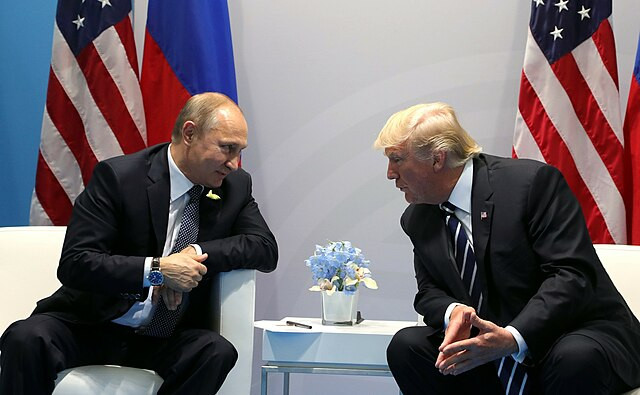President Donald Trump announced on Wednesday that he and Russian President Vladimir Putin had agreed to begin negotiations aimed at ending the war in Ukraine, marking a dramatic shift in U.S. policy that has drawn alarm from Kyiv and Washington's European allies. Trump said he spent more than an hour on the phone with Putin and described the conversation as productive. "I think we're on the way to getting peace," he told reporters at the White House.
Trump's announcement followed his remarks suggesting Ukraine may have to make territorial concessions and forgo NATO membership-positions closely aligned with Moscow's demands. "Maybe Ukraine will have to give up territory. Maybe Ukraine will not join NATO now," he said. "I think President Putin wants peace, and President Zelenskyy wants peace, and I want peace. I just want to see people stop getting killed."
The developments have unsettled U.S. allies, who were not included in the discussions. European leaders, including those from France, Germany, Poland, Spain, and the United Kingdom, issued a joint statement emphasizing that "Ukraine and Europe must be part of any negotiations." NATO Secretary-General Mark Rutte echoed those concerns, stating, "When we talk about Ukraine, Ukraine must be closely involved in everything happening about Ukraine."
Trump also suggested that he and Putin could meet in person in Saudi Arabia in the near future, though no date has been confirmed. Kremlin spokesman Dmitry Peskov said the conversation between the two leaders covered various topics, but Ukraine was the primary focus. "President Putin, in his turn, emphasized the need to remove the root causes of the conflict and agreed with Trump that a long-term settlement could be achieved through peace talks," Peskov said.
The shift in U.S. policy marks a departure from the previous Biden administration's insistence that Ukraine be a full participant in any settlement. Trump's approach has raised concerns in Kyiv, where officials fear Washington may be willing to negotiate with Moscow at Ukraine's expense. Ukrainian President Volodymyr Zelenskyy acknowledged that he spoke with Trump after the Putin call, stating, "We believe that America's strength, together with Ukraine and all of our partners, is enough to push Russia to peace."
Former U.S. Ambassador to Russia Michael McFaul criticized Trump's handling of the talks, saying, "You never give up anything to them for free." He added, "Trump is giving Putin gifts-Ukrainian land and no NATO membership for Ukraine-before negotiations even begin."
Trump's comments have also raised eyebrows within his own administration. Defense Secretary Pete Hegseth stated at a NATO meeting in Brussels that Ukraine's aspirations for NATO membership were "unrealistic" and that the U.S. would not send troops as part of any peacekeeping mission. "Returning to Ukraine's pre-2014 borders is an unrealistic objective," Hegseth said, referring to Russia's annexation of Crimea and its continued occupation of parts of eastern Ukraine.
German Defense Minister Boris Pistorius expressed regret that the U.S. appeared to be making concessions before negotiations had started. "In my view, it would have been better to speak about a possible NATO membership for Ukraine or possible losses of territory at the negotiating table," Pistorius said.
Meanwhile, Trump's Treasury Secretary Scott Bessent visited Kyiv on Wednesday, marking the first high-level visit from a member of the administration. Reports suggest that Ukraine is considering offering the U.S. access to its rare earth elements and energy resources in exchange for continued military aid.





